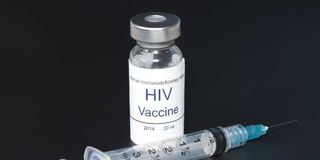Back to drawing board as HIV vaccine trial stopped

A HIV vaccine trial that was being conducted in three countries has been stopped due to poor results.
What you need to know:
- Researchers have hit dead ends since first HIV vaccine trial began 36 years ago.
- The trials were being conducted in Uganda, Tanzania and South Africa.
The largest trial in Africa for a combination of two vaccines to prevent HIV infection has been terminated due to poor results.
The clinical trial named PrEPVacc conducted on 1,500 people aged between 18 to 40 years old in Uganda, Tanzania, and South Africa was intended to test the effectiveness of two vaccine regimens and two different PrEP pills in preventing HIV infection. However, researchers stopped the trial as they found little or no chance of the trial demonstrating vaccine efficacy.
Going forward, the participants will not receive any more vaccine doses but will be followed for additional safety data collection. The oral PrEP component of the study is ongoing.
The trial that began in December 2020 was stopped last month after an interim review of progress. The final results are expected to be made public late next year.
The trial provided a great opportunities for Africa to participate and lead in efforts to prevent HIV, which has ravaged the continent, and to grow the capacity of the continent’s sites to do future trials themselves.
As of October, over 1,000 participants had received the complete vaccine regimen, and most also received one of the PrEP pills. Reviewing interim data last month, the study’s independent data monitoring committee found no safety concerns.
However, based on the early findings, they determined that the trial would likely not show that the vaccine can prevent HIV.
“We do clinical trials because we don’t know the answers to questions. It was important to find out whether the combination vaccine regimens in PrEPVacc, developed over 20 years, should be ruled out or further developed for preventing HIV,” study coordinator Dr Jonathan Weber of Imperial College London said.
He added: “While we await the final results and analysis of individual products, I believe our interim result puts this generation of putative HIV vaccines to bed.”
Dr Eugene Ruzagira, trial director from the Uganda Virus Research Institute said that even with the halting of the trial, he is optimistic that an HIV vaccine will be developed one day.
The International AIDS Society stressed the need to step up HIV vaccine research and development.
“We cannot and will not lose hope that the world will have an effective HIV vaccine accessible by all who need it, anywhere. The trial’s early discontinuation does not end HIV vaccine research, but suggests that more sophisticated approaches will be needed,” said the society’s Executive Director Birgit Poniatowski.
“A vaccine remains one of our most powerful tools to reach and change the lives of vulnerable communities and key populations in the most affected parts of the world,” she said.
“We have come so far in our HIV prevention journey, but we must look to a new generation of vaccine approaches and technology to take us forward again,” stated PrEPVacc chief investigator Dr Pontiano Kaleebu.
The failure of the experimental vaccines is a massive blow to the medical community, which has hit countless dead ends since the first HIV vaccine trial began 36 years ago.
Prof Linda-Gail Bekker, deputy director of the Desmond Tutu HIV Centre at the Institute of Infectious Disease and Molecular in Cape Town, South Africa, said HIV vaccine research should have multiple candidates being tried simultaneously.
“We are likely to get a vaccine and may be more than just one winner. We are making progress. We must not give up,” Prof Bekker said.
Although new HIV infections have reduced dramatically since its peak in the mid-1990s, UNAIDS most recent data shows that 39 million people currently live with the infection worldwide.





